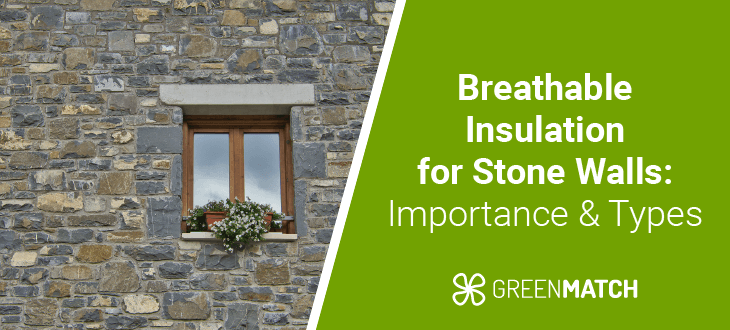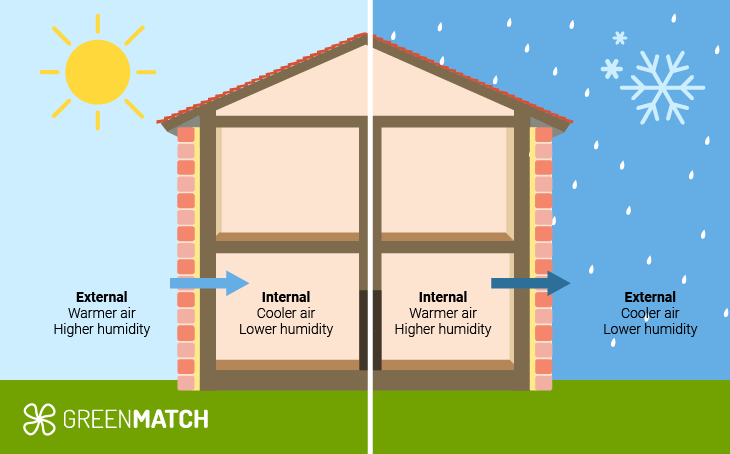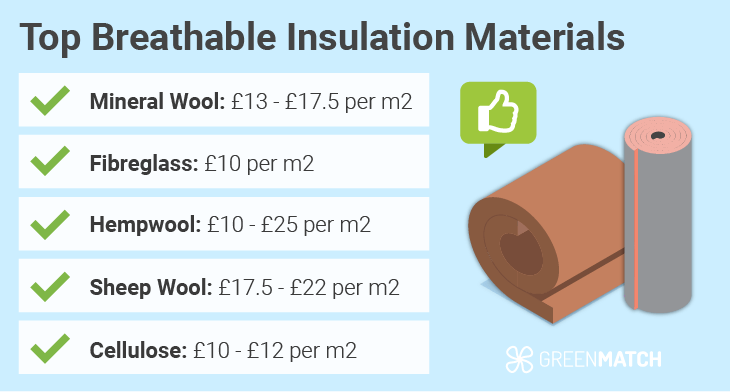Answer these simple questions and we will find you the BEST prices
Which type of solar quotes do you need?
It only takes 30 seconds
100% free with no obligation

Get Free quotes from insulation specialists near you

Save money by comparing quotes and choosing the most competitive offer

The service is 100% free and with no obligation
- GreenMatch
- Insulation
- Breathable Insulation
- Breathable Insulation for Stone Walls
Breathable Insulation for Stone Walls: Importance & Types


- It’s estimated that as of December 2023, there are over 8.5 million stone wall homes in the UK, comprising around a quarter of all housing.
- Stone walls are very porous to water vapour, meaning they require adequate ventilation to increase evaporation and reduce condensation/pooling.
- Some breathable insulation for stone walls is mineral wool, fibreglass, hemp wool, and sheep wool, all of which can be found as blankets and batts.
Solid stone wall properties in the UK account for about a quarter of the total UK housing stock. These structures are often pre-1920’s protected heritage. Made from a single-layer wall with no cavity space in between, stone walls are prime candidates for insulation due to their high propensity for heat loss. However, not all insulation materials are suited for this job.
To ensure heat retention without trapping moisture, breathable insulation materials are necessary for stone wall properties. Luckily, a range of such materials is on the market today, suited for all types of budgets, purposes and applications. This complete guide by GreenMAtch UK will provide you with all the information you need on breathable stone wall insulation.
Ready to insulate your stone wall property? Look only as far as GreenMatch UK for a one-stop solution to all your needs. Spend 30 seconds filling out our online form, and receive up to 3 free home-tailored quotes from our network of pre-vetted professionals. No charges, no obligations. Click below to begin!
- Describe your needs
- Get free quotes
- Choose the best offer
It only takes 30 seconds



Why is breathable insulation for stone walls important?

Breathable insulation materials allow heat to be retained within the property while also allowing trapped moisture to escape. This is especially important for stone wall properties due to their moisture permeability.
Walls come in different variations and properties, one of the most important being whether it is permeable or impermeable. Put simply, permeable walls – such as stone walls – allow for moisture to travel through, which can then be evaporated.
Impermeable walls on the other hand are too dense to allow moisture to pass through. Thus, these walls stop moisture from entering from both sides. These walls can be great, provided that the structure has another ventilation mechanism in place.
Since stone walls are designed to let moisture travel through, breathable insulation allows for this moisture to eventually escape and evaporate, keeping your walls and insulation material free from moisture damage, rot, and mould.
Failure to create adequate ventilation with breathable insulation will lead to moisture building on your walls and insulation. Not only can this be structurally damaging to your home and investment, but increased mould and rot growth can create health risks such as respiratory issues and illnesses.
Breathable insulation for stone walls

Today, there are plenty of sustainable, affordable and effective insulation materials that are breathable, making them suitable for stone-walled properties. Here’s a breakdown of some of the key options there are today:
- Mineral wool: Made from rock or glass, mineral wool is a sustainable blanket-like insulator that provides high-level heat retention and breathability all in one. Costing £13 - £17.5 per m2, it's one of the most popular materials due to being both water-repellent, yet vapour permeable, allowing for moisture to evaporate without leeching water. Mineral wool is suitable for both internal and outside wall insulation measures.
- Fibreglass: Fibreglass is made from recycled glass that has been woven into a blanket-like thermal sheet. Costing just £10 per m2, it's one of the most affordable options for breathable insulation. In addition to heat retention, fibreglass also boasts properties such as water, mould and flame resistance, making it ideal for both internal and external wall insulation.
- Hempwool: One of the most sustainable, hemp wool is a blanket-like sheet made from sustainable hemp plants. Costing around £10 - £25 per m2, they provide exceptional heat resistance whilst also being non-toxic, hypoallergenic and even mould-resistant. Just like its other counterparts, hemp wool is suitable for both exterior and interior wall insulation measures.
- Sheep wool: Another great sustainable insulation option, treated sheep wool is one of the most breathable insulation materials there is. Costing £17.5 - £22 per m2, sheep's wool provides impressive heat resistance while also fully hypoallergenic and non-toxic.
- Cellulose: Cellulose fibre insulation is a fully sustainable material made entirely from recycled paper and wood products. Costing just £10 - £12 per m2, this material comes as loose-fill or blow-in insulation, making it suitable only for internal (stud) wall insulation.
Certain insulation materials may be effective at retaining heat but have no breathability. They should be avoided if you have stone walls. The main insulation materials to steer clear of are:
- Spray foam: Polyurethane (PU) spray foam is a synthetic expanding polymer that may exhibit high thermal efficiency, but creates an entirely airtight seal that is completely impermeable to moisture.
- PIR board: Polyisocyanurate (PIR) boards are highly dense synthetic polymer boards that work great to insulate heat, but are entirely impermeable.
- EPS polystyrene board: Found as beads (for cavity walls) but also as rigid boards, EPS similarly is a synthetic with no breathability.
When it comes to the most breathable insulation material available, sheep's wool stands out as the most breathable insulation material. It allows for vapour to pass through, successfully preventing condensation buildup and promoting healthier home walls.
Which insulation for stone walls is best for your home?
Ultimately, the best wall insulation for your stone wall property will hinge on factors such as your budget, insulation type (internal or external), wall condition, and other preferences. As a safe option, mineral wool and fibreglass are nationwide popular options due to their affordable prices and relative sustainability, but certain materials like hemp wool and sheep wool possess just as impressive properties worth considering.
To make the best choice for your home, it's highly recommended to work with a professional installer. That way, your stone walls can be assessed, and the best course of action can be drafted out, tailored to your home. However, finding a professional within budget is not all that easy, until GreenMatch UK.
Through our services, all you need to do is spend 30 seconds filling out our online form, and we’ll send you up to 3 free home-tailored quotes directly from our network of pre-vetted professionals. No costs, no obligations. Simply click below to begin!
- Describe your needs
- Get free quotes
- Choose the best offer
It only takes 30 seconds



FAQ
Stone walls – whether thick or thin – require wall insulation measures due to their single stone layer. These walls are notoriously poor in heat retention, but are also porous, leading to heightened risk of moisture ingress.
The best insulation for stone walls is to install a breathable insulation material. Some great examples of breathable insulation materials are mineral wool, fibreglass, hemp wool and sheep wool.
One of the most breathable insulation materials available is sheep wool. Alongside providing exceptional heat retention, sheep’s wool is porous and allows for moisture to escape and evaporate without getting trapped.
Whether internal or external, stone walls are generally quite porous and may harbour moisture, requiring them to breathe. For this reason, ensure that even internal stone walls are given adequate ventilation.

Akif is a copywriter at GreenMatch since 2023. With a keen interest in community sustainability, green solutions and the role of digital media in identifying climate trends, he aims to hone in on his background in International Studies and Digital Media to provide a multidisciplinary approach to written content rooted in credible research and accuracy.
We strive to connect our customers with the right product and supplier. Would you like to be part of GreenMatch?

